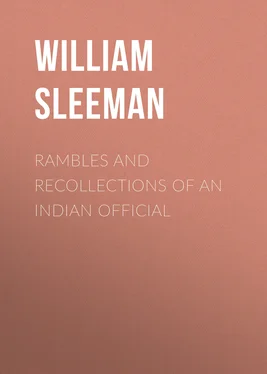William Sleeman - Rambles and Recollections of an Indian Official
Здесь есть возможность читать онлайн «William Sleeman - Rambles and Recollections of an Indian Official» — ознакомительный отрывок электронной книги совершенно бесплатно, а после прочтения отрывка купить полную версию. В некоторых случаях можно слушать аудио, скачать через торрент в формате fb2 и присутствует краткое содержание. Жанр: Путешествия и география, История, foreign_edu, foreign_antique, foreign_prose, на английском языке. Описание произведения, (предисловие) а так же отзывы посетителей доступны на портале библиотеки ЛибКат.
- Название:Rambles and Recollections of an Indian Official
- Автор:
- Жанр:
- Год:неизвестен
- ISBN:нет данных
- Рейтинг книги:4 / 5. Голосов: 1
-
Избранное:Добавить в избранное
- Отзывы:
-
Ваша оценка:
- 80
- 1
- 2
- 3
- 4
- 5
Rambles and Recollections of an Indian Official: краткое содержание, описание и аннотация
Предлагаем к чтению аннотацию, описание, краткое содержание или предисловие (зависит от того, что написал сам автор книги «Rambles and Recollections of an Indian Official»). Если вы не нашли необходимую информацию о книге — напишите в комментариях, мы постараемся отыскать её.
Rambles and Recollections of an Indian Official — читать онлайн ознакомительный отрывок
Ниже представлен текст книги, разбитый по страницам. Система сохранения места последней прочитанной страницы, позволяет с удобством читать онлайн бесплатно книгу «Rambles and Recollections of an Indian Official», без необходимости каждый раз заново искать на чём Вы остановились. Поставьте закладку, и сможете в любой момент перейти на страницу, на которой закончили чтение.
Интервал:
Закладка:
On the bank of the Bīnā river at Eran, in the Sāgar district, is a beautiful pillar of a single freestone, more than fifty feet high, surmounted by a figure of Krishna, with the glory round his head. 120 120 The pillar bears an inscription showing that it was erected during the reign of Budha Gupta, in the year 165 of the Gupta era, corresponding to A.D. 484-5. This, and the other important remains of antiquity at Eran, are fully described in A. S. R ., vol. vii, p. 88; vol. x, pp. 76-90, pl. xxiii-xxx; and vol. xiv, p. 149, pl. xxxi; also in Fleet, Gupta Inscriptions (Calcutta, 1888). The material of the pillar is red sandstone. According to Cunningham the total height is 43 feet. The peculiar double-faced, two-armed image on the summit does not seem to be intended for Krishna, but I cannot say what the meaning is (H. F. A., p. 174, fig. 121).
Some few of the rays of this glory have been struck off by lightning; but the people declare that this was done by a shot fired at it from a cannon by order of Aurangzēb, as his army was marching by on its way to the Deccan. Before the scattered fragments, however, could reach the ground, the air was filled, they say, by a swarm of hornets, that put
the whole army to flight; and the emperor ordered his gunners to desist, declaring that he was 'satisfied of the presence of the god'. There is hardly any part of India in which, according to popular belief, similar miracles were not worked to convince the emperor of the peculiar merits or sanctity of particular idols or temples, according to the traditions of the people, derived, of course, from the inventions of priests. I should mention that these hornets suspend their nests to the branches of the highest trees, under rocks, or in old deserted temples. Native travellers, soldiers, and camp followers, cook and eat their food under such trees; but they always avoid one in which there is a nest of hornets, particularly on a still day. Sometimes they do not discover the nest till it is too late. The unlucky wight goes on feeding his fire, and delighting in the prospect of the feast before him, as the smoke ascends in curling eddies to the nest of the hornets. The moment it touches them they sally forth and descend, and sting like mad creatures every living thing they find in motion. Three companies of my regiment were escorting treasure in boats from Allahabad to Cawnpore for the army under the Marquis of Hastings, in 1817. 121 121 During the wars with the Marāthās and Pindhārīs, which ended in 1819.
The soldiers all took their dinners on shore every day; and one still afternoon a sipāhī (sepoy), by cooking his dinner under one of those nests without seeing it, sent the infuriated swarm among the whole of his comrades, who were cooking in the same grove, and undressed, as they always are on such occasions. Treasure, food, and all were immediately deserted, and the whole of the party, save the European officers, were up to their noses in the river Ganges. The hornets hovered over them; and it was amusing to see them bobbing their heads under as the insects tried to pounce upon them. The officers covered themselves up in the carpets of their boats; and, as the day was a hot one, their situation was still more uncomfortable than that of the men. Darkness alone put an end to the conflict.
I should mention that the poor old Rānī, or Queen of Garhā, Lachhmī Kuār, came out as far as Katangī with us to take leave of my wife, to whom she has always been attached. She had been in the habit of spending a day with her at my house once a week; and being the only European lady from whom she had ever received any attention, or indeed ever been on terms of any intimacy with, she feels the more sensible of the little offices of kindness and courtesy she has received from her. 122 122 After we left Jubbulpore, the old Rānī used to receive much kind and considerate attention from the Hon. Mrs. Shore, a very amiable woman, the wife of the Governor-General's representative, the Hon. Mr. Shore, a very worthy and able member of the Bengal Civil Service. [W. H. S.] For notice of Mr. Shore, see note at end of Chapter 13.
Her husband, Narhar Sā, was the last of the long line of sixty-two sovereigns who reigned over these territories from the year A.D. 358 to the Sāgar conquest, A.D. 1781. 123 123 See the author's paper entitled 'History of the Gurha Mundala Rajas ', in J. A. S. B ., vol. vi (1837), p. 621, and the article 'Mandla' in C. P. Gazetteer (1870).
He died a prisoner in the fortress of Kūrai, in the Sāgar district, in A. D. 1789, leaving two widows. 124 124 Kūrai is on the route from Sāgar to Nasīrābād, thirty-one miles WNW. of the former.
One burnt herself upon the funeral pile, and the other was prevented from doing so, merely because she was thought too young, as she was not then fifteen years of age. She received a small pension from the Sāgar Government, which was still further reduced under the Nāgpur Government which succeeded it in the Jubbulpore district in which the pension had been assigned; and it was not thought necessary to increase the amount of this pension when the territory came under our dominion, 125 125 The 'Sāgar and Nerbudda Territories', comprising the Sāgar, Jabalpur, Hoshangābād, Seonī, Damoh, Narsinghpur, and Baitūl Mandlā Districts, are now under the Local Administration of the Chief Commissioner of the Central Provinces, established in 1861 by Lord Canning, who appointed Sir Richard Temple Chief Commissioner. These territories were at first administered by a semi-political agency, but were afterwards, in 1852, placed under the Lieutenant-Governor of the North-Western Provinces (now the Agra Province in the United Provinces of Agra and Oudh), to whom they remained subject until 1861. They had been ceded by the Marāthās to the British in 1818, and the cession was confirmed by the treaty of 1826.
so that she has had barely enough to subsist upon, about one hundred rupees a month. She is now about sixty years of age, and still a very good- looking woman. In her youth she must have been beautiful. She does not object to appear unveiled before gentlemen on any particular occasion; and, when Lord W. Bentinck was at Jubbulpore in 1833, I introduced, the old queen to him. He seemed much interested, and ordered the old lady a pair of shawls. None but very coarse ones were found in the store-rooms of the Governor-General's representative, and his lordship said these were not such as a Governor-General could present, or a queen, however poor, receive; and as his own 'toshakhāna' (wardrobe) had gone on, 126 126 All official presents given by native chiefs to the Governor- General are credited to the 'toshakhāna', from which also are taken the official gifts bestowed in return.
he desired that a pair of the finest kind should be purchased and presented to her in his name. The orders were given in her presence and mine. I was obliged to return to Sāgar before they could be carried into effect; and, when I returned in 1835, 127 127 By resolution of Government, dated January 10, 1836, the author was appointed General Superintendent of the Operations against Thuggee, with his head-quarters at Jubbulpore.
I found that the rejected shawls had been presented to her, and were such coarse things that she was ashamed to wear them, as much, I really believe, on account of the exalted person who had given them, as her own. She never mentioned the subject till I asked her to let me see the shawls, which she did reluctantly, and she was too proud to complain. How the good intentions of the Governor-General had been frustrated in this case I have never learned. The native officer in charge of the store was dead, and the Governor-General's representative had left the place. Better could not, I suppose, be got at this time, and he did not like to defer giving them.
Интервал:
Закладка:
Похожие книги на «Rambles and Recollections of an Indian Official»
Представляем Вашему вниманию похожие книги на «Rambles and Recollections of an Indian Official» списком для выбора. Мы отобрали схожую по названию и смыслу литературу в надежде предоставить читателям больше вариантов отыскать новые, интересные, ещё непрочитанные произведения.
Обсуждение, отзывы о книге «Rambles and Recollections of an Indian Official» и просто собственные мнения читателей. Оставьте ваши комментарии, напишите, что Вы думаете о произведении, его смысле или главных героях. Укажите что конкретно понравилось, а что нет, и почему Вы так считаете.












